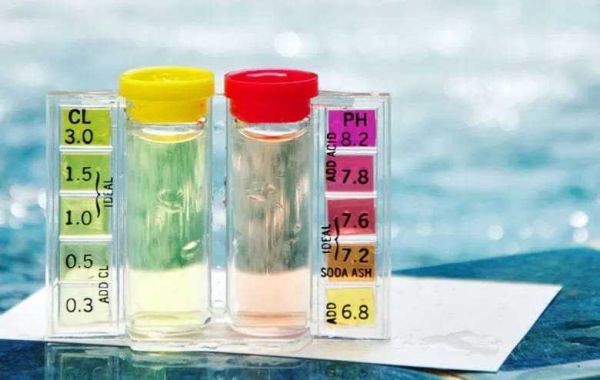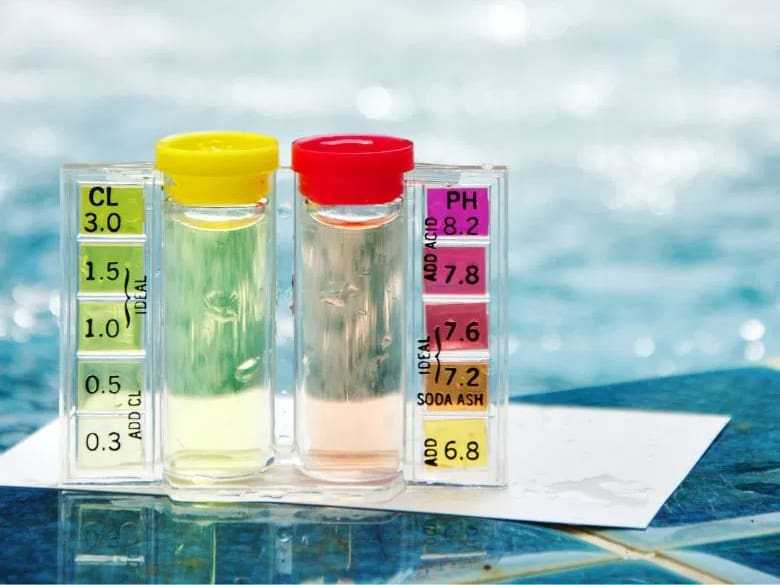1. Chlorine – The Essential Disinfectant
Chlorine is the most widely used pool chemical due to its ability to eliminate bacteria, viruses, and algae. It works by breaking down organic contaminants, such as sweat, oils, and cosmetics, ensuring the water remains clean and safe for swimming.
Types of chlorine for pools:
- Liquid chlorine – an effective option for large pools and automatic dosing systems.
- Chlorine tablets and granules – slow-dissolving and convenient for continuous disinfection.
- Salt chlorinators – use salt to naturally generate chlorine.
For effective pool sanitation, consider using Chlor Aqua Power (20L) Liquid Chlorine, a high-quality chlorine solution that ensures long-lasting water purity.
Recommendation: Maintain chlorine levels between 1-3 ppm to ensure proper disinfection without causing skin or eye irritation.
2. pH Balancers – Stabilizing Water Chemistry
The pH level of your pool water significantly impacts the effectiveness of chlorine and overall water balance. The ideal pH range is 7.2 – 7.6.
- pH Increasers (pH Plus) – used when water is too acidic, preventing corrosion of pool surfaces and equipment.
- pH Reducers (pH Minus) – lower excessive pH levels, preventing cloudy water and scaling.
For precise pH control, pH Minus (20L) is a reliable solution that helps maintain a balanced and comfortable swimming environment.
Recommendation: Use a test kit weekly to monitor pH levels and make necessary adjustments.
3. Algaecides – Preventing Algae Growth
Algae can quickly turn pool water green and make surfaces slippery. Using algaecides helps prevent and eliminate algae outbreaks.
- Preventative algaecides – added regularly to stop algae from forming.
- Shock treatments – used to remove severe algae infestations.
Recommendation: Combine algaecides with chlorine treatments and proper filtration for optimal results.
4. Shock Treatments – Deep Cleaning for Your Pool
Shock treatments involve adding a high dose of chlorine or other oxidizers to remove contaminants that regular chlorination cannot handle.
- Calcium hypochlorite – a strong oxidizer for fast-acting disinfection.
- Non-chlorine shocks – ideal for sensitive skin and hot tubs.
Recommendation: Perform shock treatments weekly or after heavy pool use, rain, or water contamination.
5. Flocculants and Clarifiers – Enhancing Water Clarity
These chemicals help remove tiny particles that cause cloudiness in pool water.
- Clarifiers bind small particles together, making them easier to filter out.
- Flocculants cause debris to settle at the bottom for vacuuming.
Recommendation: Use clarifiers regularly and flocculants when water becomes particularly murky.
6. Calcium and Alkalinity Adjusters – Protecting Pool Surfaces
- Calcium hardness increasers prevent plaster damage and equipment corrosion.
- Alkalinity increasers help stabilize pH levels, preventing fluctuations.
Recommendation: Maintain calcium hardness between 200-400 ppm and total alkalinity between 80-120 ppm.
7. Pool Water Test Kits – Essential for Monitoring Water Quality
To keep pool chemistry balanced, regular testing is essential. There are various testing options available, including digital testers, test strips, and liquid reagent kits.
Recommendation: Test pool water at least twice a week and adjust chemicals as needed.
Where to Buy High-Quality Pool Chemicals?
For the best pool maintenance products, visit Modern Pools and find a wide range of high-quality pool chemicals designed to keep your pool water crystal clear and safe.
Conclusion
Properly managing pool chemistry ensures a clean, safe, and inviting swimming environment. By maintaining balanced chlorine, pH, and other key parameters, you can prevent bacteria growth, algae formation, and equipment damage. Regular testing and the right chemical treatments will help keep your pool in perfect condition all season long.
Explore Modern Pools for top-quality pool chemicals and enjoy hassle-free pool maintenance!








